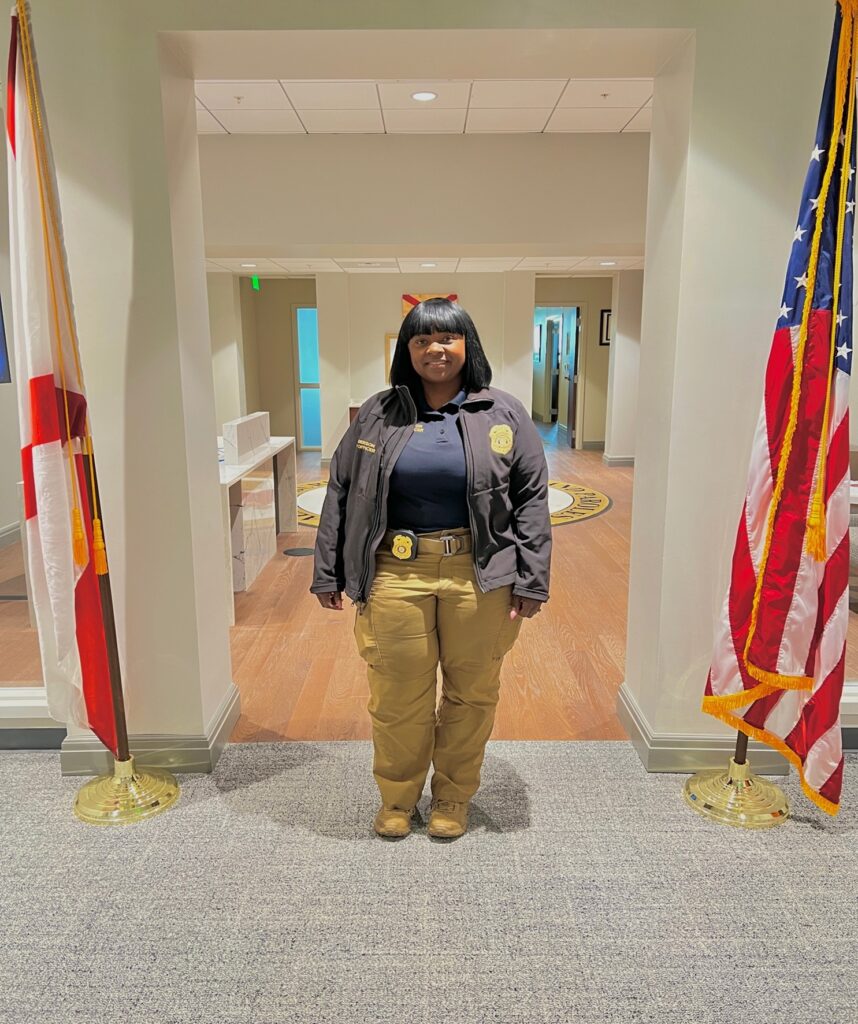By J’Marco Smith, ABPP Communications
Montgomery, Ala. – When it comes to careers in criminal justice, many people think of police officers, lawyers, or judges. But behind the scenes, there are professionals like Quenetta Fenderson, who plays a crucial role in ensuring fairness and justice through systems most people never consider. As the Acting Manager of the Board Operations Docket Unit at the Alabama Bureau of Pardons and Paroles, Fenderson’s work affects hundreds of lives each day often without recognition.
“I’m the manager in the Docket Unit of Board Operations,” Fenderson said. “A typical day for me is just making sure we have no fires. Being the manager, my main goal is to put out fires when there’s a problem that anybody in my team or unit can’t figure out or fix. My job is to go in, figure it out, and get it resolved. That’s what I do because I know how important these dates are to the inmates.”
Fenderson explained that she answers to two key groups: the agency and the incarcerated individuals her work affects. “First, we’ve got to satisfy the agency and make sure we do everything according to policy, procedure, and law,” she said. “Then we have another client the inmate and we make sure we do everything possible to get them set.”
Her primary goal is to get the docket set. “If the docket isn’t set, there are no hearings. If we’re not setting hearings, we’re not doing our job. We’re not helping the people we’re supposed to help. I want to make sure that not only is the docket set but also that the right people are on it. I don’t want someone on the docket before their time, and I don’t want someone who should be on the docket left off.”
For those unfamiliar, the “docket” refers to a schedule of parole hearings, similar to a court calendar. “It’s like a hearing document,” she said. [The Board listens] to both sides — the inmate and the victim or family — and looks at all the information in the file to see what this person has done since incarceration, how well they’ve been rehabilitated, and if they’d be a good candidate for parole.”
Fenderson didn’t initially plan on working in paroles. Her path to the role started over two decades ago. “I was hired out of college. It’ll be 21 years for me this August,” she said. She earned her undergraduate degree from Alabama State University and her master’s from Troy University in Montgomery, majoring in criminal justice and psychology. “I became a substitute teacher in college and did so well, they asked me to become certified,” Fenderson said. “They guaranteed me a permanent position. But my heart was still set on going into the criminal justice field.”
A friend suggested applying to work for Pardons and Paroles. “I knew I’d have to go through the academy, and I was scared I wouldn’t be physically fit for it,” she said. “But I prayed about it, started working out with my friend, running and exercising and it worked out.” Since then, she’s built a career rooted in service. “What keeps me going is that I’m a person of service,” she said. “As long as I know I’m helping people, that’s where I get my validation.”
She’s had more than one moment that reminded her of the real-world impact of her work. “There have been plenty of times where I’ve gotten emails, letters, and even gifts I’ve had to return because I can’t accept them,” she said with a smile. “Their families call and can’t get answers. When they finally get to me, I listen, I follow up, and I get it fixed. And they say, ‘You were the first person who gave me a real answer. Thank you.’ That means everything to me.”
Maintaining professionalism and compassion is a delicate balance in her role. “Before I even came here, I learned that no matter who you’re dealing with, even offenders, you can’t be too judgmental,” Fenderson said. “Everyone deserves respect. You’ve got to be professional. Even when people are rude, I know I’m doing the right thing. That helps me stay firm and compassionate at the same time.”
Her unit stands out from others in the department due to its high pressure and highly coordinated responsibilities. “You’ve got field services, which deals with the outside, but the Docket Unit is different,” she said. “We’re dealing with calculations, timing, and issues we often fix. A lot of times, our job starts after the Department of Corrections sends us the time sheet. Then we create the file, calculate the eligibility date, and notify the inmate. It can be stressful.”
Fenderson describes the unit as a chain. “Everything must be done in order. Intake, calculation, victims’ input — if any of the previous personnel don’t do their job, we must start over and verify everything again,” she said. “Everybody depends on the person before them.”
After more than two decades of public service, Fenderson remains grounded in her mission to help others and carry out justice with care.

Quenetta Fenderson – Acting Manager of the Board Operations / Docket Unit

